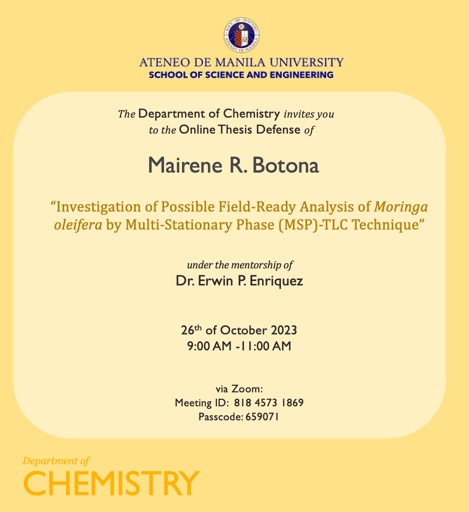Investigation of Possible Field-Ready Analysis of Moringa oleifera by Multi-Stationary Phase (MSP)-TLC Technique

ABSTRACT
Herbal medicinal plants increased the global demand for its wide use and contribution in the agricultural sector. In the Philippines, one of the most well-known herbal plants and nutritious agricultural crops is Moringa oleifera or also known as “malunggay”. Its leaves were utilized into various products such as in food supplements, natural medicines, cosmetics and personal care which also created more opportunity and income for our Filipino farmers and partnered industries. However, certain issues such as contamination or adulteration of raw material was experienced by them. Quality assurance is important to address this problem. In this study, a field-ready analysis of Moringa was developed to evaluate its quality. It adapted the Multi-Stationary Phase (MSP)-TLC11 technique developed in our laboratory wherein a especially prepared TLC plate allows for simultaneous profiling of the plant extract along different stationary phases which comprise different sectors during radial elution (as opposed to vertical elution). The MSP-sectored TLC was fabricated using screen-printing process using different concentrations of phenyltrimethoxysilanes (PTMS) and octyltriethoxysilanes as silica modifiers. Surface modifications were confirmed via FTIR and Raman spectroscopy and contact angle measurements, and UV profiling of the printed patterns. The MSP-TLC analysis of Moringa leaf extracts was coupled with photo capture of developed profiles and then followed by image analysis of the digital profiles. The data were used for objective classification of the samples using chemometrics, particularly using Soft-Independent Modelling Class Analogy (SIMCA) to discriminate the class of Moringa as “within-specification” or “off-specification”. The results showed that in 80-20 (train-test) data, the SIMCA model accuracy is 94.5%, whereas, sensitivity and specificity rate are 88.9% and 100%, respectively. The detection of adulterated samples was also observed. Overall, the new MSP-TLC method is a potential field-ready testing material and the MSP sector can be further designed for plant-specific extracts.
Keywords: Thin-layer chromatography; Soft-Independent Modelling Class Analogy; Field-ready quality assessment; Image analysis


